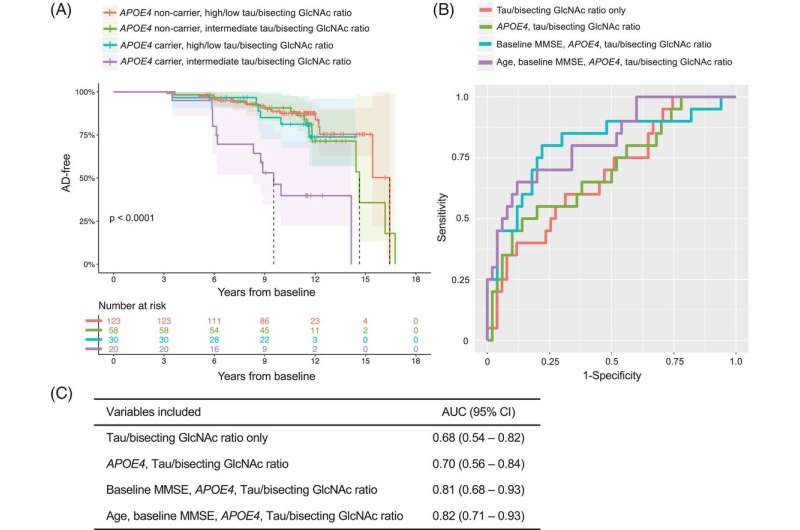This article has been reviewed according to Science X's editorial process and policies. Editors have highlighted the following attributes while ensuring the content's credibility:
fact-checked
trusted source
proofread
Sugar molecule in blood can predict Alzheimer's disease, suggests study

Early diagnosis and treatment of Alzheimer's disease requires reliable and cost-effective screening methods. Researchers at Karolinska Institutet in Sweden have now discovered that a type of sugar molecule in blood is associated with the level of tau, a protein that plays a critical role in the development of severe dementia. The study, which is published in Alzheimer's & Dementia, can pave the way for a simple screening procedure able to predict onset ten years in advance.
"The role of glycans, structures made up of sugar molecules, is a relatively unexplored field in dementia research," says the study's first author Robin Zhou, medical student and affiliated researcher at the Department of Neurobiology, Care Sciences and Society (NVS), Karolinska Institutet. "We demonstrate in our study that blood levels of glycans are altered early during the development of the disease. This could mean that we'll be able to predict the risk of Alzheimer's disease with only a blood test and a memory test."
In Alzheimer's disease, the neurons of the brain die, which is thought to be a result of the abnormal accumulation of the proteins amyloid beta and tau. Clinical trials for Alzheimer's drugs show that treatment should commence early in the pathological process, before too many neurons have died, to reverse the process before it is too late.
More blood biomarkers needed
There is both a practical and a financial need for non-invasive screening methods for Alzheimer's. Markers in blood are preferable, as taking samples of the cerebrospinal fluid is more difficult and brain imaging is expensive.
Researchers at Karolinska Institutet have now shown that the level of a certain glycan structure in blood, denoted bisected N-acetylglucosamine, can be used to predict the risk of developing Alzheimer's disease.
The research group has previously demonstrated a link between tau protein and glycan levels in people with Alzheimer's disease, but these analyses were done on cerebrospinal fluid. Glycans are sugar molecules found on the surface of proteins, the building blocks of life, and determine the location and function of these proteins in the body.
By measuring blood glycan levels the researchers found that individuals with matching levels of glycans and tau were over twice as likely to develop Alzheimer's-type dementia.
"We also show that a simple statistical model that take into account blood glycan and tau levels, the risk gene APOE4 and a memory test, can be used to predict Alzheimer's disease to a reliability of 80% almost a decade before symptoms such as memory loss appear," says corresponding author Sophia Schedin Weiss, docent at NVS, Karolinska Institutet.
17-year follow-up
The results are based on 233 participants of the Swedish National Study on Aging and Care in Kungsholmen (SNAC-K). The samples were collected between 2001 and 2004, and the participants were monitored regularly with respect to factors such as memory loss and the presence of dementia. The follow-ups were carried out every three to six years and continued for 17 years.
The researchers will now be analyzing blood samples from the remaining participants of the SNAC-K study as well as from participants of other aging studies in and outside Sweden.
"We're collaborating with researchers in primary care in Sweden to evaluate different biomarkers for dementia at primary health care centers," says Dr. Schedin Weiss. "We hope that glycans in the blood will prove to be a valuable complement to current methods of screening people for Alzheimer's disease that will enable the disease to be detected early."
The study was conducted by researchers in Lars Tjernberg's research group at the Division of Neurogeriatrics at Karolinska Institutet in collaboration with the Aging Research Center at Karolinska Institutet, the Stockholm Gerontology Research Center and Karolinska University Hospital.
More information: Robin Ziyue Zhou et al, A glycan epitope correlates with tau in serum and predicts progression to Alzheimer's disease in combination with APOE4 allele status, Alzheimer's & Dementia (2023). DOI: 10.1002/alz.13024



















